There are currently 104 people who have responded in various degrees to the reader survey.
If I limit to South Asians only, the modal reader is an Indian national, though not overwhelmingly so:
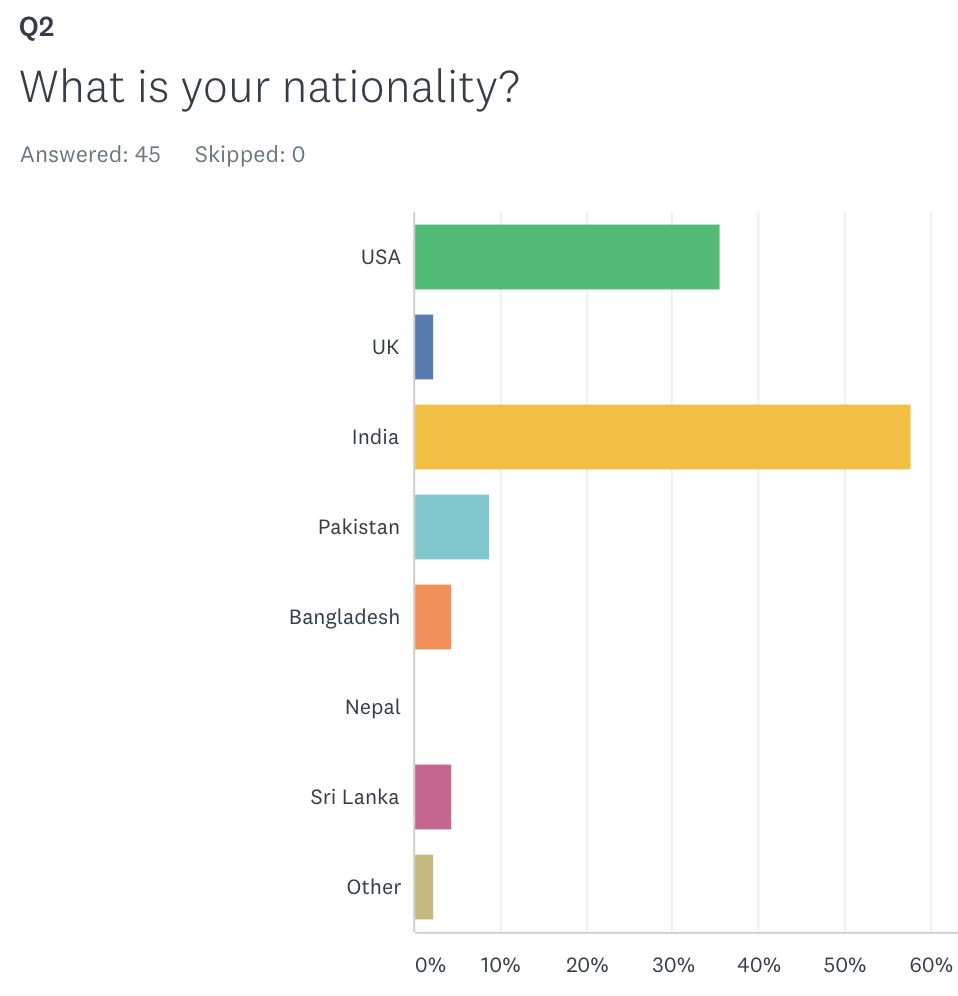
In terms of religious identity, Hindus are modal, but those who are not religiously identified are very common (I selected this latter option despite my “Muslim name” and familial cultural background, as I am not not part of any Muslim community and my children have no affinity or affiliation with that identity):
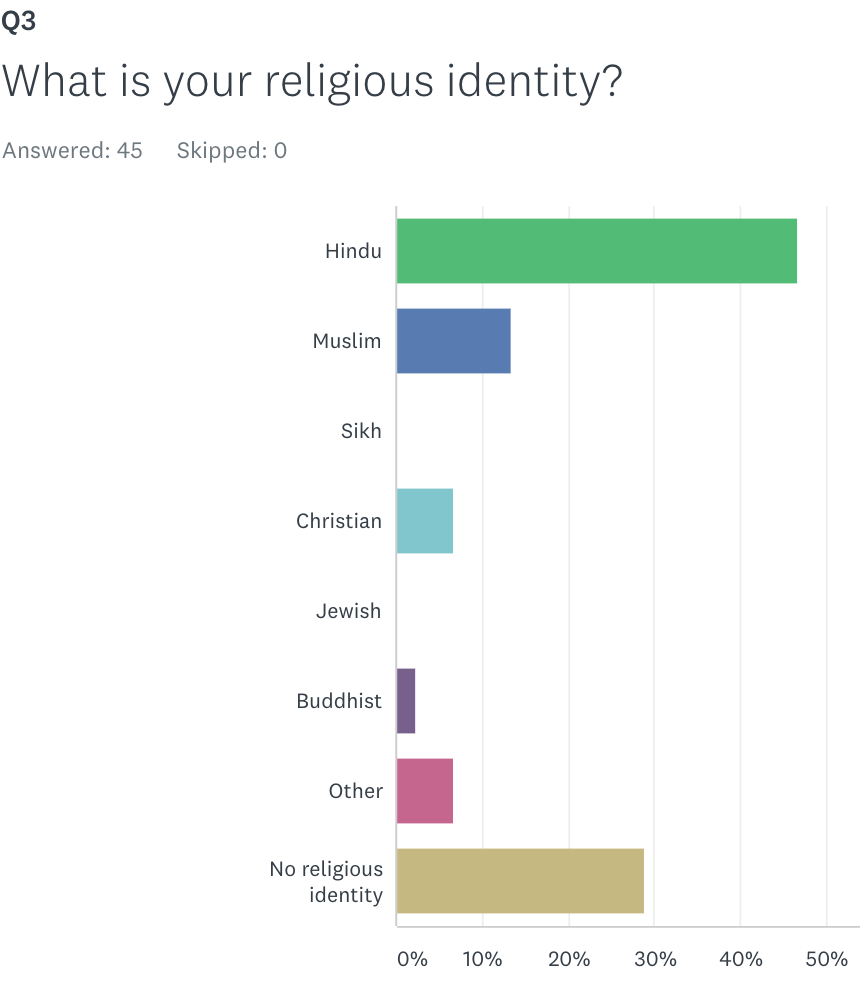
South Asian readers of this weblog are very skeptical of God:
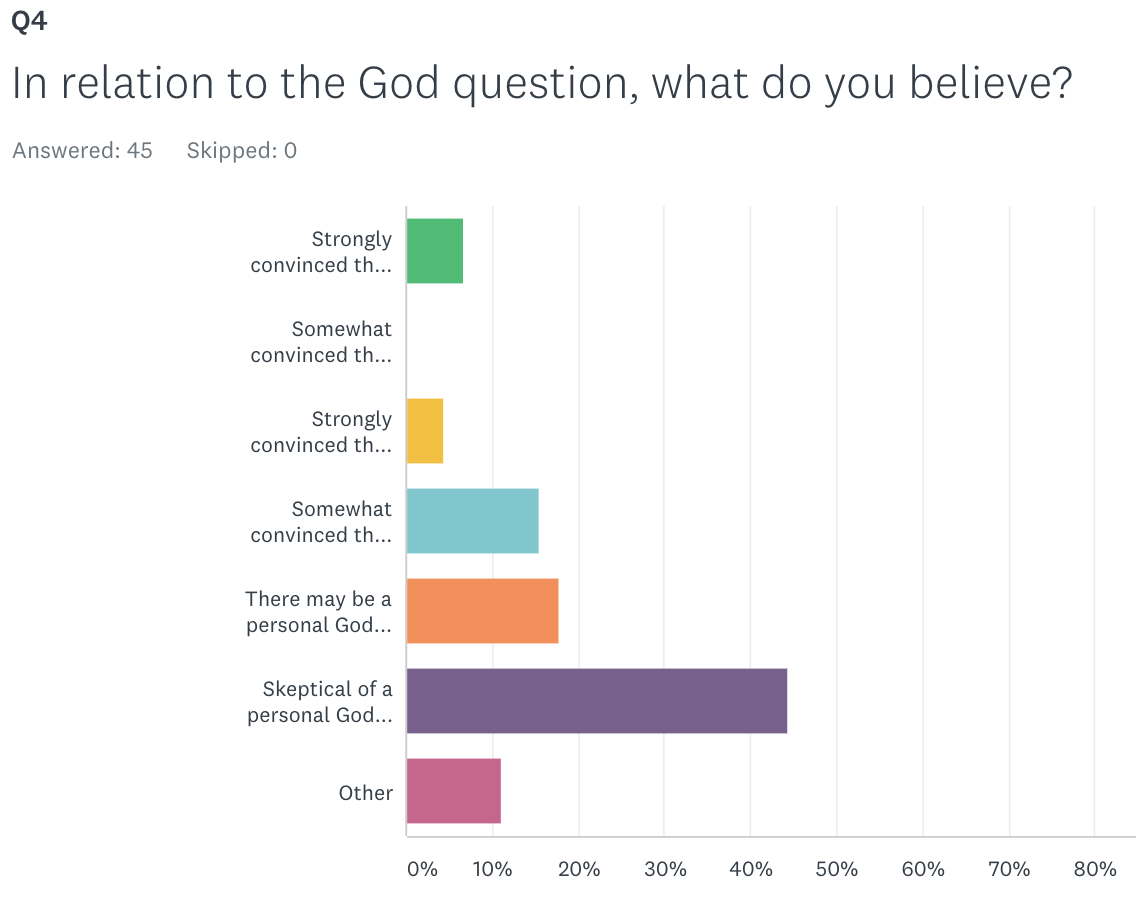
The communal background is what you’d expect:
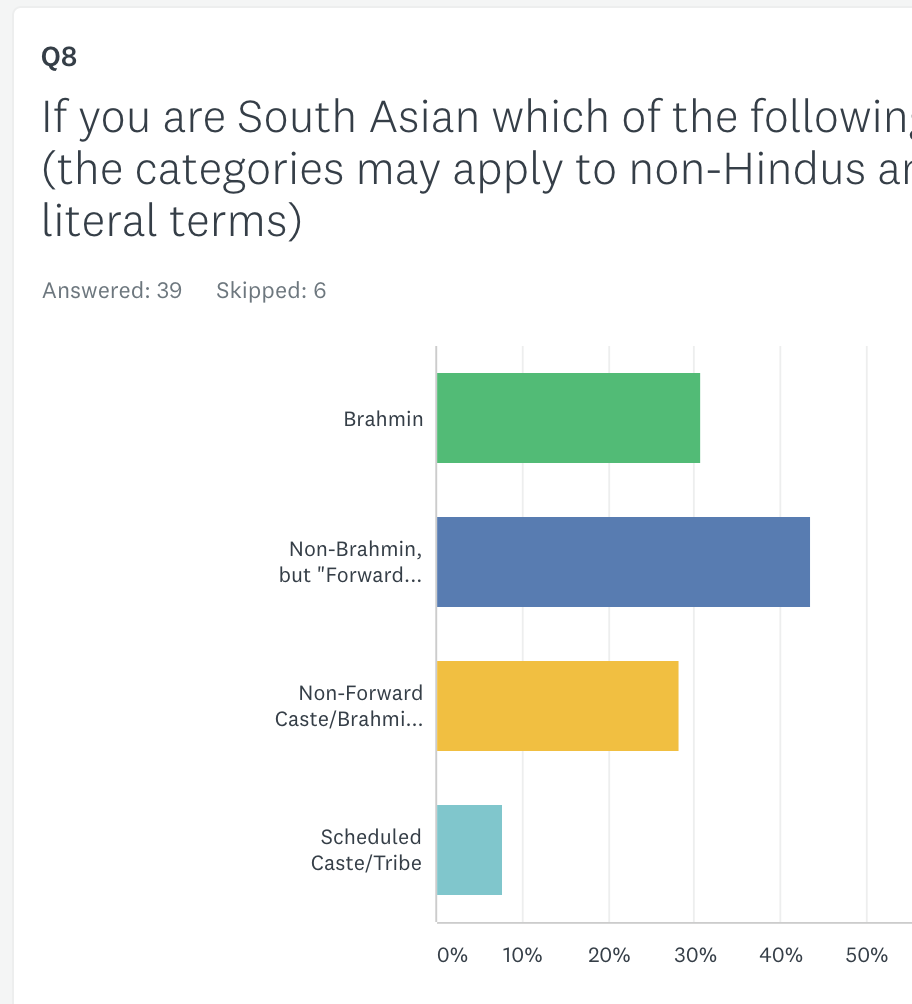
About 20% of South Asian respondents identify as Hindu nationalists, while average self-reported socioeconomic status is high.
About half of the readers of this weblog are European/white. They are more irreligious and more religiously skeptical than the South Asians. Their self-reported socioeconomic status is somewhat lower.
21 respondents said they were Hindu. Only 1 was a convinced theist:
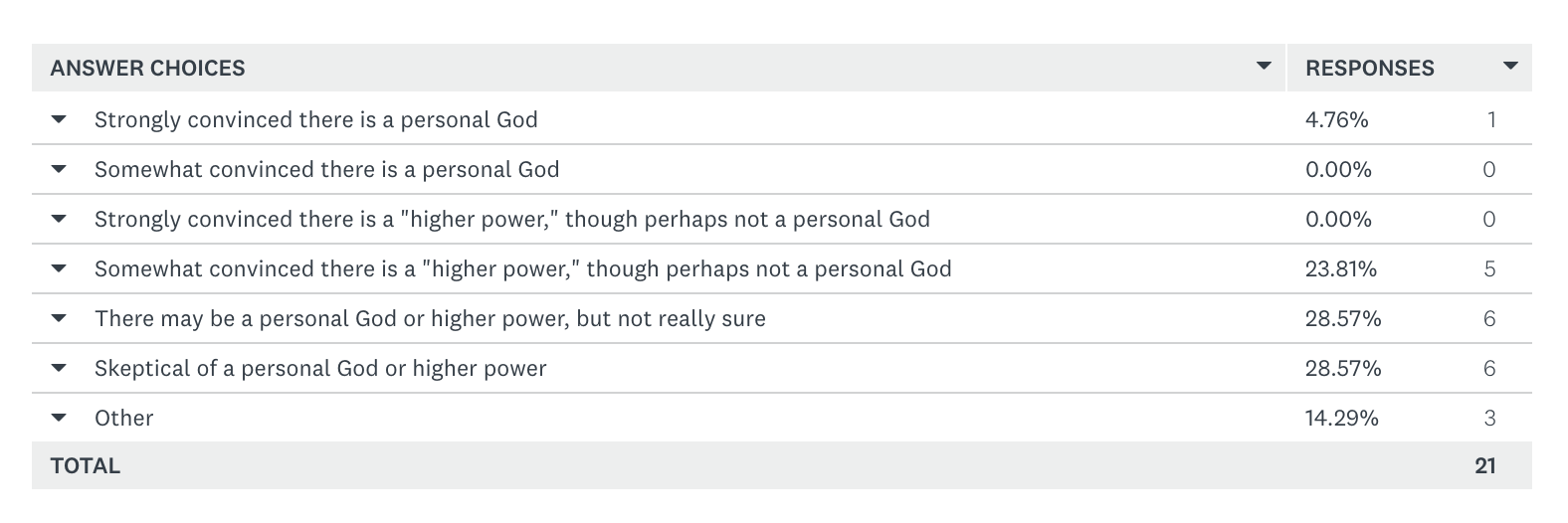
Among the Muslim respondents 4 out of 6 seem to identify as agnostic or atheist.
Of the self-identified Hindus, 8 out of 21 were Hindu nationalists. The caste breakdown of those who said they were Hindu indicates that South Asians who do not identify with Hinduism are less elite on the varna ladder:
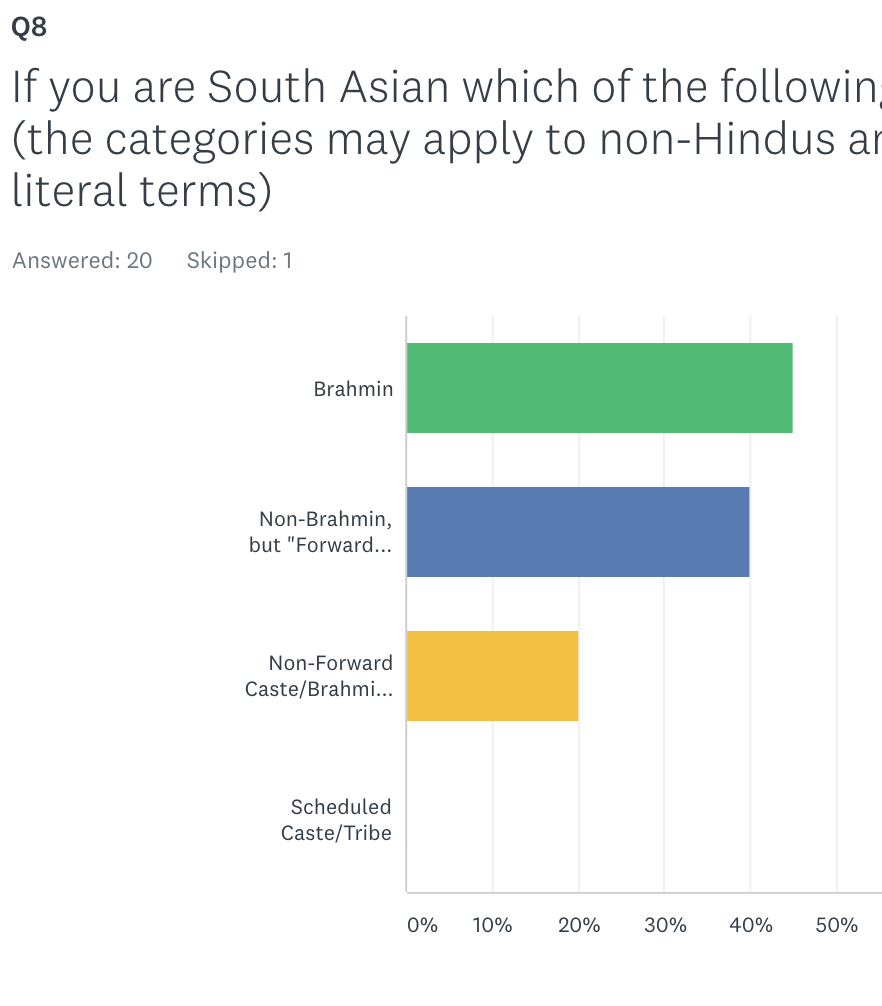
Overall, the sex ratio is one notable aspect of this blog’s core readership: 95% are male.
About 50% of the traffic on this website is from American IPs. But 40% is from Indian IPs.
That is interesting that only 20% of South Asian respondents identified as Hindu nationalists. If one looks at the comments, it seems that Hindutva (and Islamophobia) are much more represented than that. Perhaps people are expressing “soft Hindutva” views but when it comes to identifying as Hindutva on the survey, they hesitate to do that.
I was one of the “Muslims” who identified as agnostic. I am actually not very religious in my offline life. I would call myself a “Cultural Muslim” in that I do Eid and stuff like that. I end up defending Islam on BP when I perceive it is under attack. I am of the American variety of individual who believes your religion ends in your own house and I don’t want to see it in the public sphere. You can imagine that living, however temporarily, in Pakistan is extremely frustrating at times.
Kabir, which commentators do you suspect might be Hindu nationalists. I for one have no idea what that phrase means.
I haven’t seen Islamophobia at Brown Pundits.
froginthewell has himself said that he is a “Hindu nationalist”. It’s not a question of suspicion. He admitted it. I also think Vikram holds views that I would characterize as “soft Hindutva”.
If you haven’t seen Islamophobia on BP, that’s because you and I clearly have very different interpretations of what Islamophobia means and what respect for Orthodox Muslim sensibilities means. Let’s just leave it at that.
islamophobia and hindu nationalism are different categories though. lots of people are islamophobic without being hindu nationalists. like me.
Yes, I do understand that they are not necessarily overlapping categories. But in the South Asian context, Hindu nationalists (BJP voters) tend to be Islamophobic, at least according to my definition of Islamophobia. I understand that there is no objective measure for this kind of stuff.
pretty much all hindu nationalists are islamophobic.
but a lot of non-hindu nationalists who are not muslims of south asian background are islamophobic too. this includes even indian american SJWs who attack islamophobia in public, but privately tell me what a fucked up and crazy religion islam is in private 😉 [this is based on real stories after i saw some pro-islam FB posts from indian american friends and asked them what was up]
Razib, Hindu nationalists have the theological constraint of “Sarva Dharma” . . . all paths lead to the same goal and might be true. This is why Hindus are scared to directly criticize muslim masters such as Mohammed pbuh or the holy Koran.
How do you define Islamophobia?
To clarify Razib, for a Hindu to say their way is right is to say that “I know something”. All knowledge is relative, temporary and provincial. All knowledge is subject to change as we learn and become. This is why the span of “liberation” or “freedom” is said my many to be endless (or put differently there are endless levels of liberation or freedom).
For this reason any other path or religion might be partly right from a certain point of view. A mountain looks different from different languages and when viewed through different shaded lenses. Sometimes everyone is partly right.
For this reason Hindus are very reluctant to criticize Mohammed pbuh and the holy Koran. From a Hindu perspective only an extremely intelligent person with a free brain and nervous system who has carefully studied Mohammed pbuh and the holy Koran is capable of a fully holistic accurate critique.
This said, we all have the right to critique whoever we want and whatever we want from where we are at. As you have done. Your atheistic critique of the holy Koran and Mohammed pbuh is entirely appropriate and legitimate.
Razib Khan, you have respectfully studied holy Islamic scripture and developed a deep subtle nuanced sophisticated interpretation of Islamic scripture and Allah. It just happens to be atheistic of the “Ex” kind! Razib Khan Islamic theology is just as patriotic and correct as any other interpretation of Islam 🙂
Anyone who has “respectfully studied holy Islamic scripture and developed a deep subtle nuanced sophisticated interpretation of Islamic scripture and Allah” is not Islamophobic.
Long live Razib Khan theology! Long live kittens, puppies and teddy bears too!
:LOL:
Seriously, love the way you think bro. Thanks for enriching my life 🙂
in my intellectual endeavors, i try and maintain detachment.
but because i’m an atheist of muslim background i am very careful when traveling in muslim countries. so literally i’m islamophobic, i’m scared 😉
That is understandable. But if you must travel to a Muslim country for whatever reason, it is probably best for your safety not to make your views known. I’m not an atheist but even I try to avoid religious “debate” as much as possible. There is no other way to survive in the “Islamic Republic” of Pakistan.
i’m googleable. https://www.nytimes.com/2011/02/19/us/19beliefs.html
anyway, the probability of getting in trouble is low. but some of these muslims countries don’t have the best rule of law. (i went for financial reasons)
Feel you dude. Sadly your experience is extremely common. Probably over 10% of the world’s 1.6 billion muslims are patriotic atheistic muslims. I would say “Islamist-ophobic” rather than Islamophobic.
Every muslim and every non muslim in the world should have the right to freedom of art, thought, intuition and feeling. This is the only way to end the 14 century Islamic civil war.
“in my intellectual endeavors, i try and maintain detachment.” Have noticed. This drew me to your blogs. Detachment is the beginning of religion, or spirituality or whatever synonym anyone prefers. Science is religion.
Science is not a religion, Scientism can be. I think any real scientist would have a huge problem with that statement. But Razib knows better than me on this topic.
i don’t know what anan is talking about above. so i pretty much ignored it 😉 not interested in getting into semantic args.
Kabir, how do you define science? How do you define religion?
I am providing my definition of religion but others are free to disagree with me. ;- )
I don’t see why religion requires belief or faith.
I missed on this survey, just yesterday I discovered this site and subsequently I sent two comments. I do not belong to any of categories mentioned above but I will give a brief summary of my views. By pure coincidence (I hope) after my comments both topics were closed and I did not have a chance to send reply to ‘anan’. I use this opportunity to answer. Thanks Anan. I am happy to share and exchange knowledge and ideas. Also, I am open for different and opposing ideas. I am ready to jointly (and scientifically) explore insufficiently explained and known facts from the past and present them to the public. You reminded me to reread Mahabharata after long time.
I think that this is one of the most important topics which will soon rewrite world history. Right now I will not waste my time and energy on ‘powerful forces’ but later will talk more about them. There is no secret who are they. You, in your region, also had intensive encounters with some of them. I am well educated, a patriot, moderate nationalist who fully respect all other nations and races. I have so many friends and acquaintances from your region. I will not respond to provocations and dumb comments.
All the best and cheers!
Milan, you can leave comments on old articles too. Scroll to the bottom of the screen. How to contact you offline?
I will assume that AnAn and anan are the same person. Actually, I was rejected when I tried to send new comments. There is a message that two topics are closed for comments. I will ask Razib to forward you my email address for offline communication.
Razib, could you please forward my email address to ‘anan’? Thanks.
i changed the settings on comments so they autoclose after 2 weeks. i noticed that the spam filters are swamped due to spammers targeting old posts.
It is unreasonable to expect that some topics (e.g. Aryans) should be open only two weeks for comments. My opinion is that such kind of topics should be open without time limitations because they are not daily topics. Otherwise, you will very quickly run out of topics for discussion. Thanks.
Milan, your e-mail address bounced.
“21 respondents said they were Hindu. Only 1 was a convinced theist.”
This is so strange. I wonder if the difference in the interpretation of “personal God” between the Western and Indian thought played a role in this selection. In monotheist traditions, God is always watching and interfering (either blessing or punishing) with a person’s life. From what I understand from Dawkins, this is defined as ‘personal God’.
In Hindu context, I wonder if “personal God” was interpreted instead as “Ishta Devata”, which is very much possible that a devotee can feel as if they have a personal relationship with the God (e.g., Meera Bhai or Goda Devi etc). Rather than a personal God as defined by Dawkins*. That would be interesting to know.
*The main distinction is that in Dawkins definition, personal God can interfere with humans lives at any time, while Hindu context restricts even God from interfering with the karma of a human (e.g., Ramadas being jailed etc).
Most Hindus (including Buddhists, Jains, Sikhs) don’t believe in a “personal God” as the term is usually understood. But everyone has freedom of art, thought, intuition and feeling. To each their own.
There is a difference between what we say we want and what we actually want based on what we do. We often don’t consciously know what we actually want. In the same way there is a difference between what we say we believe (what we believe we believe) and what we actually believe based on what we do.
In eastern thought when the human mind interacts with a hint of the truth, this is called God. But God is not the truth. The truth has infinite names, no name, and neither infinite names and no name.
I don’t think this is strange at all. I’m of the view that “hindu” as a religious label is misleading in the same way that it is misleading to say that Socrates believed in “Olympsim” or something to that effect. Socrates was Greek and he worshiped the gods of the Greeks. Each of those gods had their own cults that developed organically over generations. So while Athena was the patron goddess of a great many Hellenic city-states, each community worshiped her in their own way.
It is important to understand this the socio-cultural dimension of traditional (whether ancient Greek or Indian) religious activity and keep it distinct from the philosophical and monastic dimension. Like in India, the ancient Greeks had a great many philosophical disputes regarding the nature of god. The Stoa famously expounded a sort of monism, while Aristotle favored the “prime mover” notion of the divine.
The point of all of this is to suggest that the whole notion of “belief in god” is itself laden with serious Abrahamic baggage. There was of course a prominent strain of atheistic thought in the Indian philosophical/monastic tradition, but the imapct on such ideas on the day-to-day socio-cultural life should not be overstated. For Hindus, like ancient Greeks and Romans, I think the critical identifier for in-group status was and is participation in the ritual tradition.
Vishal,
You are right. I think it was when the British were conducting censuses in India that they lumped anyone who did not identify as either Muslim or Christian into the category “Hindu”.
There is no defined dogma in Hinduism as there is in Islam or Christianity. Though the BJP would like to make the Ramayana the equivalent of the Holy Quran or the Bible. But lots of “Hindus” who don’t particularly like Sri Ram are going to challenge this.
For my sake i hope you are correct. But you would be astonished at how successful the RSS has been able to monothesize Hinduism already. I agree its a fight , but we are not the one winning. (even though they do lose the odd battle)
To save Hinduism they have to destroy it first..
They are definitely winning. It’s kind of flattering in a weird way that they want to “Islamize” Hinduism. One book, One God, etc.
But I too hope they get voted out in 2019. For the sake of sane Indians.
The term ‘Islamophobic’ is a pseudo-psychological term meant to hush up any criticism of Islam or Islamic practices .
‘Hindu nationalist’ is an interesting and vague term – is it a Hindu who’s a nationalist? Or someone who’s allegiance lies towards Hinduism over the Indian state? Nationalism in the Indian context is always quite difficult to define since it isn’t a European style state. Personally I think it’s possible to be a Hindu nationalist without being against the presence of other religions in India. But the current Hindutva folk are incapable of such a balancing act. Heck, they’re conception of an ideal Indian state would alienate most non-Hindi speakers.
My ideal vision of Hinduism is of a religion which isn’t insecure or closed off to the outside world, of a religion which confidently asserts it’s place on the world stage of beliefs. If a religion which isn’t envious of Islam or Abrahamic religion, and tries to remake itself in their image – for example the Indian opposition to homosexuality. But Hinduism has ways to go in this regard. Most temples in the West are still quite ethnic in their attendance – for example Tamil temple, Gujarati temple, etc. And you see almost no non-Indian people in them. Contast this to say mosques, which are quite multi-ethnic and diverse.
Siddharth, which people does “current Hindutva folk” refer to?
I don’t agree with pressuring Indians to use Hindi. This is nationalist and in some ways might be seen as hegemonic. How is this connected with Hindutva? Many South Indians who support Hindutva do not like over Hindi promotion.
The opposition to homosexuality was brought to the Iranian/Indian civilization by Islam. Much the way female blouses and extreme interpretation of female modesty were. Before Islam both men and woman followed similar moderate forms of modesty–mostly internal rather than external. Islam also damaged female empowerment in Iran/India.
Many temples cater to a particular mother tongue or particular subsect of Hinduism. That is their right. This said some eastern spiritual movements are very welcoming of non Indians.
Is part of what you are worried about related to the RSS (if that is who you are referring to) is their alliance with Sufis and RSS sponsored Sufi conferences in 1947; and their promotion of Dara Shikoh over Aurangzeb? Some muslims might see this as an intrusion into Islam by the RSS in an attempt to Hinduize Islam. Is this your concern?
Some Shiite Indians have told me that the perception that Shiites are allied with the RSS is used as an excuse by Islamists to oppress and attack Shiites. They further told me that they are often accused of being pro Jewish and pro Israel (maybe because the RSS is?).
Siddharth, when you write “the current Hindutva folk are incapable of such a balancing act” . . . is this what you are referring to?
I think a Hindu nationalist is someone who believes that India belongs to people who follow the Hindu religion rather than to all Indian citizens. These are people like Veer Savarkar, who argued that Muslims and Christians could not be trusted because their holy lands lie in the Middle East, while Hindu holy places lie within Bharat. Hindu nationalists are those who want Indian Muslims (Indian citizens) to “go to Pakistan”– a country that most Indian Muslims have nothing to do with. They are people who want to remove the word “secular” from the Indian Constitution and formally turn the country into a “Hindu Rashtra”.
I do understand that not everyone who votes BJP is a Hindu nationalist. Some people just really hate Congress. But these two groups overlap significantly.
Kabir, look forward to researching Veer Savarkar. Any additional granular details about him?
For many Hindus, “Hindu Rashtra” is synonymous with their understanding of “secular”. But they don’t explain this very well.
I completely and unreservedly condemn anyone who says that a patriotic Indian muslim should “go to Pakistan”. What are your thoughts about Indians who want “Wahhabis” and “Salafis” to return to KSA and Pakistan?
Some Hindutva have the concept of Bharatia muslims and think Indian muslims should value Indian muslim spiritual centers (Ajmer, Nizamuddin Auliya, Shirdi, other major Indian muslim mosques and centers) and Indian muslim spiritual leaders as much as Mecca and Medina and extreme KSA backed and Al-Azhar backed clerics. Sometimes their speech sounds harsh. In practice they are okay with Najaf I think. It is the Mecca and Medina and KSA Wahhabi/Salafi syndicate (linked as they are with Jihadis based on Pakistan) that angers and scares them.
Some Hinduttva also say that the Indian catholic church should select their own Indian bishop and that Indian evangelical church congregations should elect their own Indian leaders rather than allow the Pope and foreigners to appoint them. I am not fully comfortable with this stance. But this would take some time to unpack.
Veer Savarkar was a fascist and is the father of modern Hindutva. He openly praised the Nazis. These are the heroes of the BJP.
The Wiki article on him should give you a good idea about him:
https://en.wikipedia.org/wiki/Vinayak_Damodar_Savarkar
A “Hindu Rashtra” is the very opposite of secular (as is an “Islamic Republic”). Secular states belong to all their citizens, no matter what religion those citizens profess. The Indian National Congress had a vision for a secular India. The current regime wants to destroy that. They must be voted out in 2019 before they do further lasting damage. But it’s your country. Destroy it if you want. It is no concern of those of us who are not Indian nationals. As a Muslim, I feel concern for India’s Muslims. But that’s it.
Are all Wahhabi/Salafis terrorists? I wouldn’t disagree that those are problematic ideologies but on what basis does it violate one’s right to live in their homeland? I can imagine that from the perspective of a fundamentalist Indian Christian or Muslim, bringing the entirety of India into their religious fold is the patriotic thing to do, so as to save the rest of us from perdition. Is being against the Indian state unpatriotic?
+21 Girmit
Is the last sentence a typo? Isn’t being against one’s state unpatriotic? I would say the same about any Pakistani against the Pakistani state.
Thanks for the info Kabir. I need to do more research. It appears that Veer had an expansive view of Hindu and Hindustan that included bharatiya Muslims and Christians.
He also opposed Quit India in 1942 and wanted the Indian army to stop Hitler. He formed coalition governments with Jinnah and Muslims.
How famous is Veer today?
Anan, not a typo. Some believe in drawing a distinction between the state, the nation, and the territory. The risk of conflating the state and the nation is that it leads to a totalitarian polity, one where citizens can be conceived of as property of the state. Some of the more compelling criticisms of Marxism incorporate this idea into their arguments.
Anan,
Savarkar was a fascist. But hey whatever, if you want to be charitable towards him go ahead. He believed India belonged to Hindus not to all those who happened to be born within India’s boundaries (which is how civilized countries behave).
If India belongs to Hindus than Kashmir is not part of India, given that it is Muslim majority. Logically, then Kashmir deserves freedom from a Hindu country. Hindutva people cannot have their cake and eat it too.
State and nation are different. United kingdom has 4 nations English, Welsh, Scottish and Northern Ireland. Actually the last one consists of Irish nationalists and UK Loyalists.
So more than 1 nation can live under one state whether it is Republic or Kingdom or Mulladom.